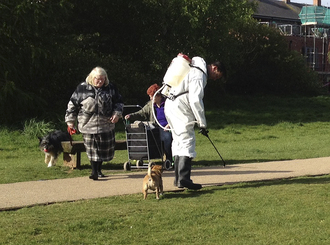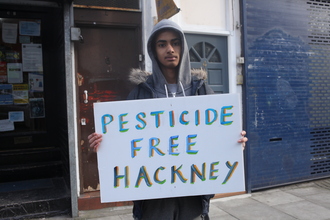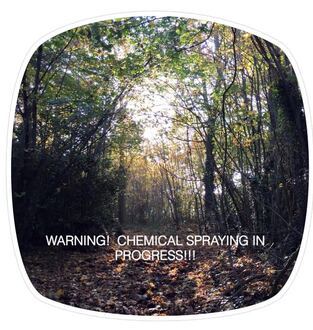Stop using dangerous pesticides in our towns and parks

Find your local campaign
Your Location
Campaigns (141)
-
FalmouthBan Dangerous Pesticides in Falmouth, CornwallThe use of glyphosates has already been banned or restricted in 8 countries. It is not acceptable that ourselves, our children and the animals we share our community with are being routinely exposed to these chemicals whether we like it or not. Falmouth was recently named "The Best Place to Live" in the South West by The Sunday Times. They failed to mention the streets, parks, play areas and some of the schools are doused with health harming poison. This is a matter of great importance for those of us who care about each other's health and the health of our children, our cats, our dogs and all the flora and fauna of this town. If you don't live in this area, click here to start a campaign for your city: https://secure.38degrees.org.uk/start-a-pesticide-campaign1,003 of 2,000 SignaturesCreated by Pesticide Free Cornwall
-
StokeBan Dangerous Pesticides in Stoke-on-TrentThe use of glyphosates has already been banned or restricted in 8 countries. It is not acceptable that ourselves, our children and the animals we share our community with are being routinely exposed to these chemicals whether we like it or not. This is a matter of great importance for those of us who care about each other's health and the health of our children, our cats, our dogs and all the flora and fauna of this city. If you don't live in this area, click here to start a campaign for your city: https://secure.38degrees.org.uk/start-a-pesticide-campaign897 of 1,000 SignaturesCreated by Philippa Jane Brown
-
Ban Dangerous Pesticides in CornwallThe use of glyphosates has already been banned or restricted in 8 countries. It is not acceptable that ourselves, our children and the animals we share our community with are being routinely exposed to these chemicals whether we like it or not. This is a matter of great importance for those of us who care about each other's health and the health of our children, our cats, our dogs and all the flora and fauna of this county. If you don't live in this area, click here to start a campaign for your city: https://secure.38degrees.org.uk/start-a-pesticide-campaign1,834 of 2,000 SignaturesCreated by Neil Foss
-
Newton AbbotBan Dangerous Pesticides in Newton AbbotThe use of glyphosates has already been banned or restricted in 8 countries. It is not acceptable that ourselves, our children and the animals we share our community with are being routinely exposed to these chemicals whether we like it or not. This is a matter of great importance for those of us who care about each other's health and the health of our children, our cats, our dogs and all the flora and fauna of this town. If you don't live in this area, click here to start a campaign for your city: https://secure.38degrees.org.uk/start-a-pesticide-campaign920 of 1,000 SignaturesCreated by Jessica Ford
-
Ban Dangerous Pesticides on the Isle of WightThe use of toxic glyphosate chemicals in weedkillers has already been banned or restricted in 8 countries. We are extremely concerned that our community, including young children and dogs, and our precious wildlife are being routinely exposed to glyphosate that the World Health Organisation states is 'probably carcinogenic'. You may well be aware that attitudes to wild plants have changed in recent decades and that pristine lawns without wild flowers are now outdated. These plants add colour and interest to our parks. They also serve as indicators of a healthy and safe lawn, both for us and for insect pollinators, especially bees, on whose services we depend for our food. If you don't live in this area, click here to start a campaign for your city: https://secure.38degrees.org.uk/start-a-pesticide-campaign1,366 of 2,000 SignaturesCreated by Margaret Nelmes
-
EdinburghBan Dangerous Pesticides in Edinburgh regionThe use of glyphosates has already been banned or restricted in 8 countries. It is not acceptable that ourselves, our children and the animals we share our community with are being routinely exposed to these chemicals whether we like it or not. This is a matter of great importance for those of us who care about each other's health and the health of our children, our cats, our dogs and all the flora and fauna of this city. If you don't live in this area, click here to start a campaign for your city: https://secure.38degrees.org.uk/start-a-pesticide-campaign87 of 100 SignaturesCreated by Julie Watt
-
BasildonBan dangerous pesticides in Basildon.The use of glyphosates has already been banned or restricted in 8 countries. It is not acceptable that ourselves, our children and the animals we share our community with are being routinely exposed to these chemicals whether we like it or not. This is a matter of great importance for those of us who care about each other's health and the health of our children, our cats, our dogs and all the flora and fauna of this community. If you don't live in this area, click here to start a campaign for your city: https://secure.38degrees.org.uk/start-a-pesticide-campaign396 of 400 SignaturesCreated by Mark Dale
-
LondonPesticide Free HackneyThere is growing evidence chemicals (such as glyphosate ) used for pest and weed control in Hackney are damaging to human health, in particular children. Our kids need to be able to play safely in Hackney parks - face down in the ground - without fear of exposure to glyphosate and other toxic nasties. Likewise shoppers, sunbathers, exercises, dog walkers, BBQ-ers, yogis - whoever and whatever you get up to in Hackney's wonderful streets and green spaces - should be able to do so without fear of being squirted by the weed control truck. I've been sprayed by it twice as it merrily made it's way up Dalston Lane. Once while heavily pregnant. Glyphosate alone is linked to cancers, birth defects, infertility, autism and parkinson disease. The World Health Organisation has publicly stated glyphosate 'probably' causes cancer. Progressive cities such as Paris, Toronto and recently Brighton, have already voted to end the use of toxic chemicals, such as glyphosate, in all public space. If they can do it, so can Hackney! Alternative means of controlling weeds already exist. Products that are non-harmful to human health and the environment are available. Why risk the health of our children - and ourselves - when there is another way? PS: Get informed! Read up about the issue by visiting Pesticide Action Network - Pesticide Free Towns campaign page and click on the Further Reading button. http://www.panap.net/sites/default/files/Poisoning-Our-Future-Children-and-Pesticides.pdf3,054 of 4,000 SignaturesCreated by Sarah Bentley
-
STOP SPRAYING GLYPHOSATE CHEMICALS ON SOUTH GLOUCESTERSHIRE STREETS AND PARKS.South Gloucestershire Council currently uses glyphosate chemical herbicides on our streets and parks despite there being viable safe alternatives and despite the fact that the World Health Organisation (WHO) has identified glyphosate as likely to cause cancer in humans. The WHO finding sits alongside a wealth of existing evidence that raises alarming questions marks over the long term safety of exposure to glyphosate both on its own and in combination with other chemicals found in formulas such as Roundup. The use of glyphosates has already been banned or restricted in 8 countries. It is not acceptable that our children, ourselves and the animals we share this county with are being routinely exposed to these chemicals whether we like it or not. The Council needs to exercise the precautionary principle and follow the example of cities such as Chicago, Paris and Rotterdam by banning this spraying in public places. This is a matter of great importance and urgency for those of us who care about each other's health and the health of our children, our dogs and cats and all the flora and fauna of this county, and of course including our beloved bees. There are viable safe alternatives to glyphosates. The Netherlands have outright banned glyphosates in public spaces and are using a hot water treatment instead. A hot water and foam method is also available in the UK and South Gloucestershire Council is already aware that this can be a more effective alternative than hot water on its own. Glyphosates are the cheapest option but we must send the message loud and clear that value is not just about price and that the health and safety issues around glyphosate render its 'cheap and easy' status irrelevant. Other effective methods may cost more in cash terms but represent far better value to local residents. Using a formula such as glyphosate or Roundup in our public spaces is simply unacceptable no matter how cheap and quick it makes the task of urban weed management. Other European cities have already banned them and now Glastonbury have paved the way here in the UK and have now banned glyphosates and are implementing the foam/hot water method instead. At their next meeting, Bristol City council will vote on whether to do the same following a petition that was handed in on 19th January. People-power stopped these pesticides elsewhere - can 38 Degrees members in South Glos stop them here too? If you think chemical pesticides, that have serious health concerns, no longer have a place on the streets of South Glos then please sign the petition and also email your local councillor and request that they stop spraying outside of your property and all areas! You can find your councillor details here: https://council.southglos.gov.uk/mgMemberIndex.aspx Further information can be found in the following links: The Guardian: Glyphosate is a 'probably carcinogenic' pesticide. Why do cities still use it? http://www.theguardian.com/cities/2015/apr/21/glyphosate-probably-carcinogenic-pesticide-why-cities-use-it The Independent: Glyphosate: Scientists urge caution over experts' claims pesticide is 'probably' carcinogenic: http://www.independent.co.uk/news/science/glyphosate-scientists-urge-caution-over-experts-claims-pesticide-is-probably-carcinogenic-10397787.html A safer non-toxic option is now used: http://www.centralsomersetgazette.co.uk/Glastonbury-takes-look-town-s-weed-problem/story-27651682-detail/story.html Bristol Council Website: A motion to ban the use of glyphosates will be voted on at the full council meeting after a petition was handed in on 19th January: https://www2.bristol.gov.uk/committeeMeetingFinder The Bristol Cable https://thebristolcable.org/2015/10/bristol-monsanto-and-chemicals/1,373 of 2,000 SignaturesCreated by Sonia Adrissi
-
BristolStop spraying Monsanto glyphosates on Bristol's streets and parks.Bristol Council currently uses four glyphosate herbicides including Monsanto's Roundup on our streets and parks. This is despite the fact that the World Health Organisation (WHO) has identified glyphosate as likely to cause cancer in humans. The WHO finding sits alongside a wealth of existing evidence that raises alarming questions marks over the long term safety of exposure to glyphosate both on its own and in combination with other chemicals found in formulas such as Roundup. The use of glyphosates has already been banned or restricted in 8 countries. It is not acceptable that ourselves, our children and the animals we share this city with are being routinely exposed to these chemicals whether we like it or not. If Bristol is to have any credentials as the current European Green Capital, it must exercise the precautionary principle and follow the example of cities such as Chicago, Paris and Rotterdam by banning this spraying in public places. This is a matter of great importance for those of us who care about each other's health and the health of our children, our cats, our dogs and all the flora and fauna of this city, of course including our beloved bees. For more information see this article from The Bristol Cable: https://thebristolcable.org/2015/10/bristol-monsanto-and-chemicals/ There are viable safe alternatives to glyphosates. The Netherlands have outright banned glyphosates in public spaces and are using a hot water treatment instead. A hot water and foam method is also available in the UK and Bristol Council is already aware that this can be a more effective alternative than hot water on its own. Glyphosates are the cheapest option but we must send the message loud and clear that value is not just about price and that the health and safety issues around glyphosate render its 'cheap and easy' status irrelevant. Other effective methods may cost more in cash terms but represent far better value to local residents. Using a formula such as Roundup in our public spaces is simply unacceptable no matter how cheap and quick it makes the task of urban weed management.7,392 of 8,000 SignaturesCreated by Zaheer Mamon









